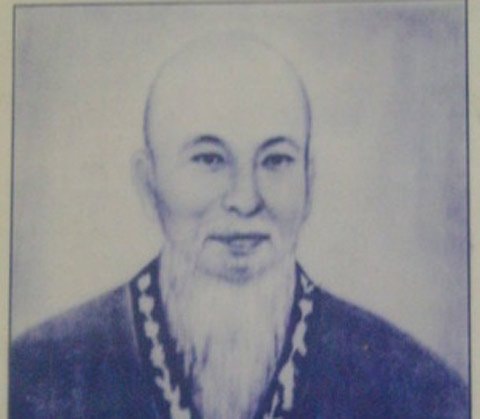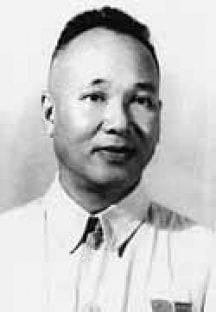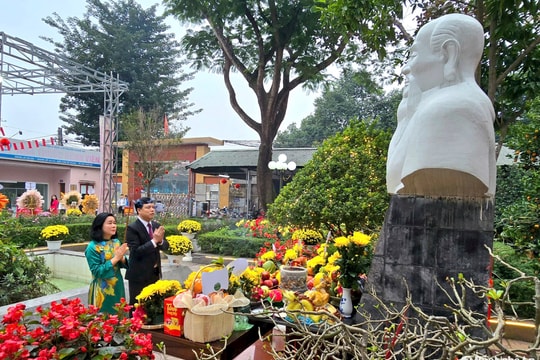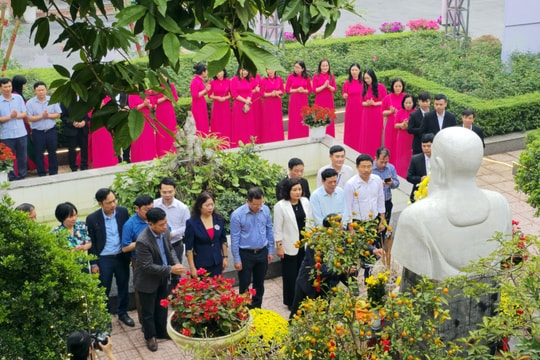7 Famous Physicians in Vietnamese History
(Baonghean.vn) - "A good doctor is like a parent" - since ancient times, doctors have had a very high position in society and through their contributions to the community and the medical industry, their reputation has been passed down in history.
1. Famous physician Tue Tinh (1330-?):

Zen Master Tue Tinh
Famous Physician Tue Tinh’s real name is Nguyen Ba Tinh, from Nghia Phu village, Cam Giang district (Hai Duong province). Tue Tinh is considered the saint of traditional medicine, the founder of Vietnamese traditional medicine. He is the author of the famous books “Nam Duoc Than Hieu” and “Hong Nghia Giac Tu Y Thu”, the first person to promote the idea of “Traditional medicine cures Vietnamese people”. Hong Nghia Giac Tu Y Thu is our oldest medical book.
Orphaned at the age of 6, Nguyen Ba Tinh was raised and educated by monks of Hai Trieu and Giao Thuy pagodas. With his talent and diligence, at the age of 22, he passed the Thai Hoc Sinh exam under the reign of King Tran Du Tong, but did not become an official but stayed at the pagoda to become a monk with the dharma name Tue Tinh. His days as a monk were also the days he specialized in studying medicine, making medicine, and curing and saving people.
At the age of 55 (1385), the famous physician Tue Tinh was sent as tribute to the Ming Dynasty court. In China, he continued to practice medicine, became famous, and was appointed by the Ming Emperor as the Great Physician Zen Master. He then died there, the year is unknown.
2. Famous physician Hai Thuong Lan Ong

Famous physician Le Huu Trac
Hai Thuong Lan Ong's real name is Le Huu Trac (1720 - 1791). He was born in Van Xa village, Lieu Xa village, Duong Hao district, Thuong Hong prefecture, Hai Duong province. He was born into a family with a tradition of learning: His grandfather, uncles and aunts all passed the Doctorate exam and became mandarins in the court. His father passed the Third Class Doctorate exam and served as Minister of Public Works under the Le Du Tong dynasty. He was the 7th child so he was also called Uncle Chieu Bay.
He is a great physician, a great cultural figure of our country, the author of the famous book Lan Ong Tam Linh or Hai Thuong Y Tong Tam Linh, consisting of 28 volumes, 66 books covering all aspects of medicine: Medical ethics, Medical theory, Medical techniques, Pharmacy, Nutrition. Another important part of the book reflects the literary career and ideology of Hai Thuong Lan Ong. Hai Thuong Lan Ong's medical career has greatly contributed to building the national medicine of our country, so he is honored as the Great Physician of Vietnam.
3. Professor Ho Dac Di

Professor Ho Dac Di
Professor Ho Dac Di (1900 - 1984), went to France to study (1918-1932), passed the residency exam. Here, Ho Dac Di did surgery for a while at Tenon Hospital, then returned to Vietnam. …
In his medical doctoral graduation thesis in Paris, Professor Ho Dac Di was the first person to create a gastric surgery method (gastroduodenal anastomosis) to treat pyloric stenosis caused by gastric-duodenal ulcers, replacing the previously used method of gastric resection, which has been mentioned in many textbooks and works and has been recognized for its value for 30-40 years.
According to the history books of the Vietnamese medical industry, with 21 works currently found out of 37 published works, he is the first surgeon, worthy of being highly appreciated by the council of professors (all French) and elected as the first Vietnamese professor.
He was a National Assembly delegate from the 2nd to the 5th terms, a member of the National Assembly Standing Committee from the 2nd, 3rd and 4th terms, the Rector of Hanoi Medical University, Director General of Vietnam University Affairs, Director of the Department of Universities and Vocational Secondary Schools, a member of the State Committee for Science and Technology, President of the Vietnam-France Friendship Association, a member of the Central Committee of the Vietnam Fatherland Front, President of the Vietnam Medical Association, the First Class Independence Medal, the First and Second Class Resistance Medals, the First and Second Class Labor Medals, the Medal for the Young Generation, and the National Emulation Fighter in 1952 and 1956. Professor Ho Dac Di was awarded the Ho Chi Minh Prize. He passed away on June 25, 1984.
4. Doctor Pham Ngoc Thach

Doctor Pham Ngoc Thach
Dr. Pham Ngoc Thach (1909-1968) was born in Quy Nhon, Binh Dinh province. In 1928, he was a student at Hanoi Medical University. In 1934, he graduated as a medical doctor in France. After two years, he returned to Saigon, opened a private clinic and hospital specializing in treating tuberculosis and lung diseases.
Dr. Pham Ngoc Thach was a famous intellectual in the upper class in Saigon, coming from a noble royal family, respected by the French and the Japanese, and joined the revolution very early. He stood up to organize the Vanguard Youth, a powerful force that was the core of the mass movement to seize power in the August Revolution. He was the first President of the Vietnam Youth Union.
He was the first Minister of Health of independent Vietnam (Provisional Government of the Democratic Republic of Vietnam (September 1945 - January 1946). From 1954, he was Deputy Minister, Secretary of the Party Committee (1954-1958) and then Minister of Health (1958-1968). He built a people's health system in the North.
His contribution to the medical sector in the South was enormous. More than anyone else, he cared about the battlefield in the South. Right after 1955, he gathered cadres from the South, mostly nurses, to train them to become medical doctors, then doctors, as well as train pharmacist assistants to become secondary school pharmacists, then university pharmacists and sent them to the battlefield.
Founder of the Central Tuberculosis Institute. Directed many research projects on tuberculosis prevention (dead BCG), tuberculosis treatment (filotop, subtilis stimulation) as well as many lung diseases (chronic bronchitis, pneumoconiosis, lung fungus, lung parasites, etc.), laying the foundation for the formation of tuberculosis and lung diseases specialties in Vietnam. Built the Vietnamese health network, organized grassroots health care as a premise for implementing the primary health care policy later. Posthumously awarded the Ho Chi Minh Prize (1996).
Doctor Pham Ngoc Thach was awarded the first Labor Hero title of the Health sector in 1958, at the first National Emulation Heroes and Soldiers Festival. The State posthumously awarded the Ho Chi Minh Prize in 1997 for his contributions in the field of science.
5. Professor Dang Van Ngu

Professor Dang Van Ngu
Professor Dang Van Ngu (April 4, 1910 - April 1, 1967), was from An Cuu village, on the outskirts of Hue. He graduated as a medical doctor in 1937 from Hanoi Medical University. He then worked as an assistant to French doctor Professor Henry Galliard, head of the Parasitology Department at the Indochina Medical University (the predecessor of Hanoi Medical University).
In 1942, he was the head of the Parasitology Laboratory and completed 19 famous scientific research projects. In 1943, he went to study in Japan. In 1945, he was the president of the Association of Patriotic Overseas Vietnamese in Japan.
In 1949, he returned to the country to join the resistance war against the French, becoming a lecturer and Head of the Department of Parasitology at the University of Medicine in Chiem Hoa. During his time participating in the resistance war against the French in the Viet Bac war zone, he successfully researched how to produce Penicillin liquid medicine, this antibiotic contributed greatly to the treatment of infections for wounded soldiers and people in the resistance war against the French and the Americans later.
In 1955, he founded the Vietnam Institute of Malaria, Parasitology and Entomology (Central) and was the first Director of this institute. During the Vietnam War, he focused on research on the prevention and treatment of malaria in Vietnam.
On April 1, 1967, he died in a US B52 bombing raid, at a location on the Truong Son mountain range in Thua Thien - Hue province, while researching malaria. He was posthumously awarded the first Ho Chi Minh Prize in the field of Medicine.
6. Professor Ton That Tung
Professor Ton That Tung (1912 -1982) was born in Thanh Hoa and grew up in Hue. In 1932, he studied at the School of Medicine and Pharmacy, then in 1935, he was recruited with 10 other students to work as an outpatient at Phu Doan Hospital. In 1935, he was the only one accepted to work in the surgical department of the School of Medicine and Pharmacy, which is now the Viet Duc Hospital.

Professor Ton That Tung
With a rudimentary instrument, he carefully dissected the structure of the liver. Based on that, he wrote and successfully defended his medical doctoral thesis entitled “The division of blood vessels in the liver”. With this thesis, he was awarded the Silver Medal of the University of Paris (the University of Medicine and Pharmacy in Hanoi was a part of it at that time).
In the 1960s, he successfully researched the method of “planned liver resection”. To acknowledge the merit of the first person who discovered this liver resection method, people called it “Dry liver surgery method” or “Ton That Tung method”.
After the success of the August Revolution, Ton That Tung was one of the first intellectuals to enthusiastically build the Medical University of the Democratic Republic of Vietnam.
In 1947, he was appointed by the Government to hold the position of Deputy Minister of Health. After peace was restored, he was appointed Director of the Vietnam-Germany Friendship Hospital and Head of the Foreign Affairs Department of Hanoi Medical University.
In 1958, the Professor successfully performed the first heart surgery in Vietnam. In 1959, he developed the department of brain surgery and pediatric surgery. In 1960, he was the first person to propose and successfully apply liver surgery using the Vietnamese method. In 1965, he successfully implemented heart surgery using an artificial heart-lung machine in our country.
In 1977, the professor was awarded the Lannelongue International Surgical Medal by the Paris Academy of Surgery. This is a noble award for outstanding surgeons in the world, awarded every five years. He is honored and worthy to be one of 12 people in the world and the only person in Vietnam to be awarded this medal...
With his great contributions and achievements to the country, Professor Ton That Tung was awarded the title of Hero of Labor, the First Class Labor Medal twice, the First Class Soldier Medal, the Third Class Resistance Medal and posthumously awarded the Ho Chi Minh Medal.
7. Professor Dang Van Chung

Professor Dang Van Chung
Professor Dang Van Chung (1913-1999), born in Sa Dec, Dong Thap province. In 1933, he passed the entrance exam to the Indochina University of Medicine and Pharmacy; in 1937, he passed the entrance exam to become a resident physician at Bach Mai Hospital. When the national resistance war broke out (December 19, 1946), he went to the war zone with Professor Ho Dac Di to build a Medical School in the mountains and forests of Viet Bac.
In 1954, Professor Dang Van Chung was the one who laid the foundation for the establishment of the internal medicine departments of Bach Mai Hospital as well as the internal medicine departments of Hanoi Medical University... In the 1970s, Professor Dang Van Chung devoted much effort and intelligence to writing two books on Internal Medicine and Treatment as well as a series of valuable teaching materials and scientific research works.
After the country's reunification in 1975, Professor Dang Van Chung and his senior teachers built a program and implemented training for resident physicians, level I and level II specialists... He opened many training classes for physicians in Ho Chi Minh City and the southern provinces.
With over 60 years of dedication, the professor has held many important positions in the health sector such as Head of Internal Medicine Department, Vice Rector of Hanoi Medical University and Head of Internal Medicine Department - Bach Mai Hospital, Vice Chairman of the Science and Technology Council of the Ministry of Health.
He was awarded the Third Class Independence Medal, First Class Labor Medal, First Class Anti-American Resistance Medal by the Party and State, along with many other noble awards. In 2000, President Tran Duc Luong signed Decision No. 392 KT/CTN to posthumously award Professor Dang Van Chung the Ho Chi Minh Prize for the "Internal Medicine Research Cluster".



